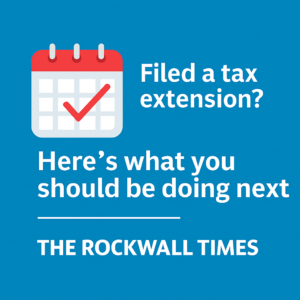Starting January 1, 2025, the IRS will implement updated standard mileage rates for individuals using their vehicles for business, medical, moving, or charitable purposes. These rates offer taxpayers in Rockwall and surrounding areas a straightforward way to calculate vehicle-related deductions or reimbursement rates for specific uses. Let’s explore the updated rates, how they work, and what local taxpayers should consider when planning their deductions for the upcoming year.
The updated mileage rates for 2025 are as follows:
• Business Use: 70 cents per mile – a 3-cent increase.
• Medical Purposes: 21 cents per mile – unchanged.
• Moving Purposes (Qualified Active-Duty Military): 21 cents per mile – unchanged.
• Charitable Purposes: 14 cents per mile – set by statute and unchanged from 2024.
These rates apply to all types of vehicles, including fully-electric, hybrid, gasoline, and diesel-powered cars, vans, pickups, or panel trucks.
Why Are These Mileage Rates Important?
Commuting in and around Rockwall for daily business operations, network meetings, and charitable work are all deductible expenses that when applied over the course of the year can drastically reduce your taxable income and put money back into your pocket.
Let’s see how this applies to your specifically:
• As a small business owner in Rockwall you can deduct 70 cents per mile for driving to client meetings, supplier pickups, or other work-related travel.
• A volunteer from Heath serving at a local charity can deduct 14 cents per mile for trips made in service to the organization.
• An active-duty military member in Greenville relocating to a satellite duty station can claim 21 cents per mile for moving-related travel expenses.
Here’s who can benefit from these mileage deductions under current tax laws:
1. Business Use: Self-employed individuals and business owners in Rockwall, Heath, and Royse City can deduct mileage for travel related to their work, such as visiting clients, attending events, or managing off-site operations.
2. Medical Purposes: Residents can deduct mileage for medical travel to doctors, hospitals, or specialists in nearby cities like Dallas or Plano.
3. Moving Expenses: This deduction is limited to active-duty military personnel relocating under orders to a permanent change of station (PCS).
4. Charitable Purposes: Volunteers in Rockwall County can deduct mileage for service-related travel, such as driving to fundraisers or delivering goods for local organizations.
Standard Mileage Rate vs. Actual Expenses
Taxpayers have two options when claiming vehicle-related deductions:
1. Standard Mileage Rate: This is a simplified option that calculates deductions based on the IRS mileage rates mentioned above. It is ideal for those who prefer not to track every vehicle-related expense. This is the most common method for most small businesses.
2. Actual Expenses: This method requires detailed records of costs such as gas, maintenance, insurance, and depreciation. This method would be ideal for individuals with high vehicle expenses as compared to mileage.
Practical tips to maximize their mileage-related deductions:
Knowing is not enough. You must know and apply what you have learned in order to earn the bonuses and savings. So, let’s look at some of the key components you will need to audit proof your deduction.
1. Maintain Accurate Records: Use a mileage-tracking app or logbook to document trip details, including dates, purposes, and destinations.
2. Plan for Tax Filing Early: Start organizing vehicle-related receipts and records now to avoid stress during tax season.
3. Understand Local Travel Patterns: Commuting over the Ray Hubbard Bridge to get into Dallas can often be frustrating. Using Route 66 is an option depending on your location. Either way, keep track of these longer trips, as they can add up quickly for deductions.
4. Consult a Tax Professional: A tax expert familiar with the needs of local small business owners, medical professionals, and volunteers can help maximize deductions and ensure compliance with IRS rules.
Finally, let’s look at some examples of how the minute amounts can add up:
• Case 1: A Small Business Owner in Heath
A freelance photographer drives 10,000 miles a year to various locations for shoots. Using the 2025 business mileage rate, they could deduct $7,000 (10,000 miles × 70 cents).
• Case 2: A Volunteer in Rockwall
A resident drives 1,000 miles annually to deliver meals for a local charity. They can deduct $140 (1,000 miles × 14 cents).
• Case 3: An Active-Duty Military Member in Royse City
Relocating under orders to a new station, they drive 500 miles. They can deduct $105 (500 miles × 21 cents).
BRASS TAX MOMENT
Under the Tax Cuts and Jobs Act (TCJA), certain deductions are restricted such as unreimbursed employee travel expenses. This means that employees cannot deduct mileage for work-related travel unless reimbursed by their employer. Only active-duty military members can claim moving expenses, leaving civilian relocations ineligible for this deduction.
The updated mileage rates for 2025 provide a valuable opportunity for local taxpayers to offset the costs of vehicle use. Whether you’re a small business owner, an active-duty military member, or a dedicated volunteer, understanding these rates and how to apply them can lead to significant tax savings.
With careful planning and accurate recordkeeping, residents can take full advantage of these deductions.
About the Author

Based in Rockwall, Texas, Karena Burgess brings over 18 years of financial experience, including 8 years on active military duty and 10 years with the Department of Defense. As an IRS Enrolled Agent (EA) and Certified Tax Resolution Specialist (CTRS), Karena specializes in solving complex tax issues and helping individuals stay on track with the IRS.
Contact:






































